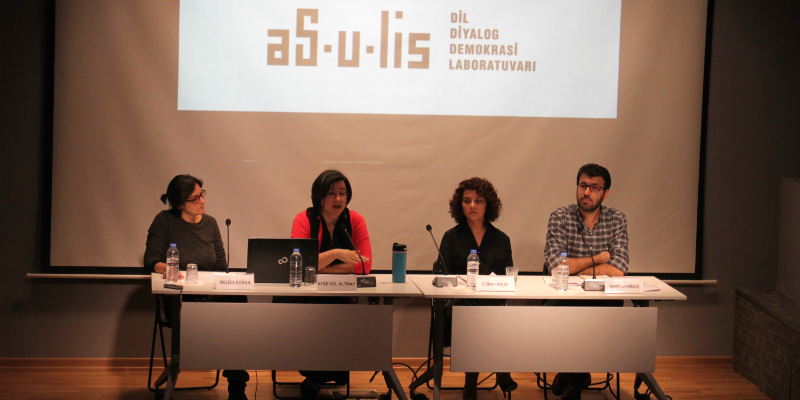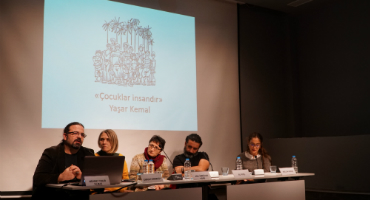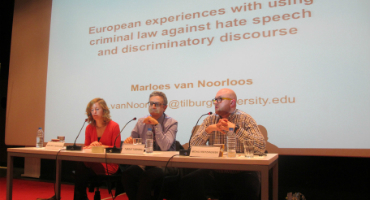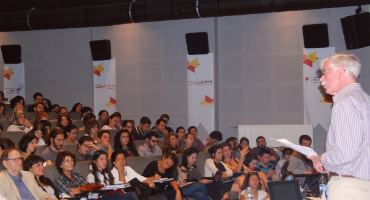“Language, Identity and Discrimination in Turkey’s Education System” panel, which was organized by ASULIS Discourse, Dialogue, Democracy Laboratory of the Hrant Dink Foundation, was held at Hrant Dink Foundation Havak Hall on November 2, 2016. During the panel, the issues of language politics, identity and discrimination in Turkey’s education system were discussed under the moderation of Ayşe Gül Altınay with the participation of Şerif Derince, Elmas Arus and Melisa Soran.
Şerif Derince talked about how monolingual education and the issue of mother tongue in Turkish education system negatively affect Kurdish children, through touching upon the study of ‘Dil Yarası’, which was conducted in collaboration with Vahap Coşkun and Nesrin Uçarlar. He underlined how the inability to speak in one’s mother tongue suppresses one’s voice, this silence continues lifelong, and this continuum of silencing involves both physical and psychological violence. Derince indicated that a systemic discrimination becomes apparent when the issue of mother-tongue is considered as a whole process which culminates in stigmatization, lack of self-confidence, quiescence and the inability to take initiative on the part of Kurdish students. He also added that an education solely based on mother tongue is not sufficient to eliminate discrimination. Therefore, he remarked that the solution lies not in an education based on mother-tongue, but instead in multilingual education practices. In his concluding remarks, Derince emphasized that, the experiences of Kurds stemming from language politics of Turkish nation-state, should not be limited to the discussion of discrimination and inequality as they are, for Kurds, an integral part a larger problem of existence and right to life.
After Derince’s speech, Elmas Arus pointed out that Romas are not a homogeneous group contrary to common belief and Roma groups who experience different lives and speak different languages live through the same injustice, poverty, and discrimination. She underlined that Romas are exposed to discrimination in many intersecting areas such as education, employment, sheltering, and health. Emphasizing attitudes of school managements and teachers towards Roma children along with their current problems of sheltering and poverty, Arus mentioned that Roma children are faced with insuperable barriers in front of their access to education. Towards the end of her speech, Arus mentioned how Roma children have been guided by the state to rehabilitation schools in recent years and how the lack of inspection of these schools exacerbates the discrimination they are going through.
Finally, the last speaker, Melisa Soran discussed the discrimanatory practices towards LGBTI and disabled students which frequently lead them to drop out of school. She emphasized that the social structure, which is based on the maintenance of the institution of family, defines individuals solely with categories of ‘man’ and ‘woman’, hence reproducing gender norms and rendering people, who deviate from these norms, vulnerable to discrimination. She indicated that, not recognizing children’s sexual identity and sexual orientation in the school environment triggers a series of exclusionary practices which often end up with a dropout. In her final remarks, Soran claimed that merely building a school environment accessible for disabled students is inadequate to reduce the exclusion they are experiencing; rather it is necessary to transform the biased social perception which imagines the disabled people as ‘incomplete’ and ‘deficient’.
Towards the end of the panel, moderator Ayşe Gül Altınay emphasized that, while talking about discriminations, everybody needs to question their own ‘privileges’ and to realize what they lose while they are enjoying what they have. She also underlined that healing is possible only by touching and feeling the wound of each other. In the question-answer session, the issue of Syrian refugee children’s access to education and the discrimination they are exposed at schools were discussed with the contribution of the audience.





